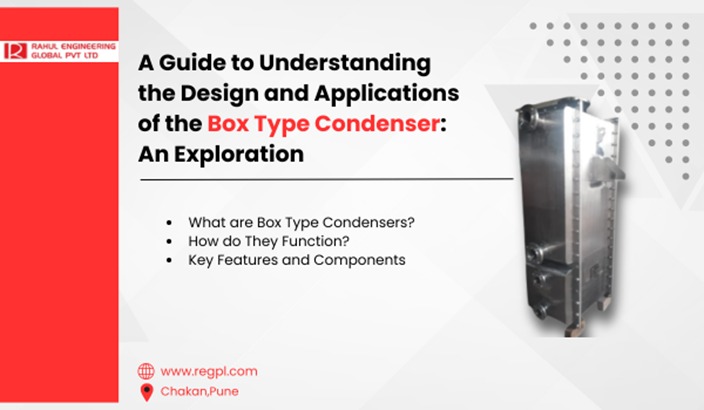
The box-type condensers are very essential in the thermal management of various industrial and commercial applications, wherein they are simply referred to as box-type condensers or merely condensers in HVAC systems. Let's find out the features and uses of box-type condensers and why they are important for HVAC systems.
What are box-type Type Condensers?
Box-type condensers are modules in air conditioning and refrigeration systems used to abbreviate refrigerant vapor into liquid. They got the name "box type" because of their normally enclosed, small design that wraps up all the parts requisite for concentration and heat exchangers.
How do they function?
Heat Exchanger: Box-type condensers work with the principle of heat exchanger. The hot refrigerant vapor from the compressor enters the condenser coils in the box-type unit.
Condensation: Depending on the condenser type, heat is lost by the refrigerant vapor while it is traveling through coils and abbreviating into liquid form.
Cooling: During condensation, latent heat from the refrigerant is given out and dissipated through the fins or tubes into the condenser. As a result, the refrigerant can be cooled again and set up to start the cycle.
Key Features and Components
Coils: Inside the condenser box, these are normally copper or aluminum and effectively conduct the heat from the refrigerant to the surrounding medium.
Fans of Water Flow: In an air-cooled system, box condensers are fitted with fans that force the ambient air over the coils, while in a water system, they are cooled by having the water flow through the coils.
Enclosure: The process guides air or water flow via the condenser coils in a box-type condenser and ensures the enclosure protects all the interior components and promotes effective heat exchanger performance.
Applications
Box-type condensers for integral components in many HVAC applications include commercial refrigeration. Low-temperature refrigeration systems are used in supermarkets, restaurants, and cold storage facilities.
Air conditioning systems form a huge part of domestic and commercial air conditioners, which help make indoor temperatures bearable by extracting heat.
It finds applications in chemical processing and manufacturing facilities, and industrial cooling is used where exact temperature control is required in processes.
Heat Pumps: Box-type condensers play a crucial role in heat pumps by facilitating the transfer of heat between different environments.
Considerations
When choosing or maintaining box-type condensers, considerations include:
Ensure that the size and capacity suit the air conditioning or refrigeration system in which it is installed.
Maintenance: Cleanliness of coils and fans should be ensured to gain maximum heat transfer efficiency and extend the life of the condenser.
Environmental Factors: This condenser will work best considering the outside variables like humidity and ambient temperature.
Conclusion
Box-type condensers have uppermost importance in every HVAC system; in their absence, no effective heat transfer and standard functioning of the air conditioning or refrigeration systems could be sought. Notwithstanding their small size, their efficient heat exchanger properties make them perfect in service for innumerable uses in different sectors of the economy. By selecting the appropriate condenser regarding the requirements and understanding of how it works, a guarantee is given for full, reliable, and efficient operation of the thermal management systems.
Rahul Engineering Global Pvt. Ltd. specializes in providing advanced and high-quality box-type condensers in Pune, India, solutions for various industries.
